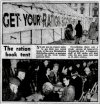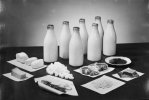-
Welcome to this forum . We are a worldwide group with a common interest in Birmingham and its history. While here, please follow a few simple rules. We ask that you respect other members, thank those who have helped you and please keep your contributions on-topic with the thread.
We do hope you enjoy your visit. BHF Admin Team
You are using an out of date browser. It may not display this or other websites correctly.
You should upgrade or use an alternative browser.
You should upgrade or use an alternative browser.
Rationing
- Thread starter Astoness
- Start date
Richard Dye
master brummie
Great video! When I worked in a butchers shop after school and Saturdays. We had the same machine but with no power. It was hard work slicing trays of bacon then stacking them for display. Even harder was cleaning every nook and cranny with hot bleach soap water!
Great memories though!
Richard Dye
master brummie
My memories of margarine back then was oil in block form. It was better than nothing although not much better. My mother would buy half pound of butter and half pound of marg!I see that margarine was an option. What did it taste like back then? I assume margarine was just margarine unlike the variations there are today.
Still not a fan even with those fancy tubs!
Richard Dye
master brummie
I remember that day…coming home from school, my mother gave me sixpence to go to the Polar Bear Sweet shop on Lozzells Rd. I was that proverbial kid in a candy store!wow sweets again Wednesday 5 February 1953
With shelves stacked to the gunnels with sweets and treats of every colour, flavour and description sweet lovers today are perhaps a little bit spoilt for choice. But 70 years ago today our grandparents could only have dreamt of the choice we all enjoy today. On the Food Minister stood up in Parliament and announced to the Commons that ration and price control on chocolate and sweets had officially come to an end across the United Kingdom. Sweet rationing began during the dark days of World War Two on 26 July 1942 when people had a weekly ration of just 2 ounces of sweets or chocolate. A month later the ration was doubled for eight weeks and then cut back to 3 ounces a week
View attachment 190961View attachment 190963
Richard Dye
master brummie
It was stunning to go get what you wanted without having your ration book or one of the points in your hand!what a treat that must have been
As I remember it, margarine then di not have much of a taste. It just provided a fatty material to put on bread or bake with. i don't believe many of the spreads sold today can technically be called margarine, as margarine is supposed to have at least 80% fat. True margarine is really only, nowadays, for baking purposesMy memories of margarine back then was oil in block form. It was better than nothing although not much better. My mother would buy half pound of butter and half pound of marg!
Still not a fan even with those fancy tubs!
Eric Gibson
master brummie
Pretend butter made in a plastics factory a bit like all the Linda McCartney 'meat free' stuff.
Echo was an early margarine after the rationing was lifted. During the rationing, margarine was marketed as "special margarine" in greaseproof and the wording in brown. I remember it so well. I had only tasted margarine being born in 1945 and couldn't get used to the creaminess of butter. For that reason my Mom bought Echo margarine for me for many years and I've never taken to butter. I use Flora now. The Maypole grocery chain also produced their own brand of cheap margarine marketed as "Mayco" which tasted the same as Echo.Margarine was pretty awful. The one I remember was called Echo and there was a small shop in Park Lane that would cut a slab in half to help
people who did'nt have much money. not a fan of these modern spreads, I like butter on my toast in the morning.
Richard Dye
master brummie
Most grocery chains had their own brand of margarine: CO-OP, George Mason etc. I am a fan of butter, unsalted, that’s what my wife cooks with. We prefer Irish/European butters although there are some very good US butters from Wisconsin.Echo was an early margarine after the rationing was lifted. During the rationing, margarine was marketed as "special margarine" in greaseproof and the wording in brown. I remember it so well. I had only tasted margarine being born in 1945 and couldn't get used to the creaminess of butter. For that reason my Mom bought Echo margarine for me for many years and I've never taken to butter. I use Flora now. The Maypole grocery chain also produced their own brand of cheap margarine marketed as "Mayco" which tasted the same as Echo.
Eric Gibson
master brummie
Our mom used to melt marg and add in an Oxo cube to make a sort of 'dripping' spread.
anthea
master brummie
My father worked at the Salvage Department where there was a very good canteen. He used to bring Lurpac (spelling ?) butter sandwiches for me when I was a young girl because he thought the 'best butter' would be good for me. Perhaps we couldn't afford to buy Lurpac or maybe it was hard to find a supplier.
A Sparks
master brummie
Yes, when I worked at a Saturday job in a grocery store back in the late 60s I remember Lurpac was the most expensive butter so I guess the best!My father worked at the Salvage Department where there was a very good canteen. He used to bring Lurpac (spelling ?) butter sandwiches for me when I was a young girl because he thought the 'best butter' would be good for me. Perhaps we couldn't afford to buy Lurpac or maybe it was hard to find a supplier.
mw0njm.
A Brummie Dude
Lurpak has scooped the coveted first prize of best butter brand at the biannual World Championship Cheese Contest. Winning in the Salted Butter Category with a best in class score of 99.8 out of 100, Lurpak beat off competition from over 30 other leading butters to take the title.Lurpak has scooped the coveted first prize of best butter brand at the biannual World Championship Cheese Contest. Winning in the Salted Butter Category with a best in class score of 99.8 out of 100, Lurpak beat off competition from over 30 other leading butters to take the title.
makers said “We are delighted to achieve this global recognition for Lurpak. As a brand that has a real heritage of Danish excellence that only uses the very best natural ingredients, we strive to produce a world class product. Since 1901 we have been at the forefront of quality butter, setting the standard where only the very best is good enough.”

makers said “We are delighted to achieve this global recognition for Lurpak. As a brand that has a real heritage of Danish excellence that only uses the very best natural ingredients, we strive to produce a world class product. Since 1901 we have been at the forefront of quality butter, setting the standard where only the very best is good enough.”

Richard Dye
master brummie
I’ll have to see if it is available in the US and give it a try!Lurpak has scooped the coveted first prize of best butter brand at the biannual World Championship Cheese Contest. Winning in the Salted Butter Category with a best in class score of 99.8 out of 100, Lurpak beat off competition from over 30 other leading butters to take the title.Lurpak has scooped the coveted first prize of best butter brand at the biannual World Championship Cheese Contest. Winning in the Salted Butter Category with a best in class score of 99.8 out of 100, Lurpak beat off competition from over 30 other leading butters to take the title.
makers said “We are delighted to achieve this global recognition for Lurpak. As a brand that has a real heritage of Danish excellence that only uses the very best natural ingredients, we strive to produce a world class product. Since 1901 we have been at the forefront of quality butter, setting the standard where only the very best is good enough.”
View attachment 192899
mw0njm.
A Brummie Dude
Ration coupons
In January 1940, every man, woman and child was issued with a ration book. These books contained coupons, which people could exchange for certain amounts of produce from different shops. Shoppers were given 16 coupons per month to spend on food items they wished. These could be traded and spent as follows:
Rice: 8 coupons
Sardines: 2 coupons
Sultanas: 8 coupons
Skimmed milk: 5 coupons
Currants: 16 coupons
Baked beans: 2 coupons
Biscuits (dry): 2 coupons
Biscuits (sweet): 4 coupons
Herrings: 2 coupons
Sultanas: 8 coupons
Stewed steak: 20 coupons
Rolled oats: 2 coupons
Sausage-meat: 12 coupons
Best Red Salmon: 32 coupons per small tin
Richard Dye
master brummie
Seems like a lot of milk!This photograph shows the amounts of butter, milk, bacon, lard, sugar, cheese, tea and jam received by two people per week in Britain in 1943 during WWII.View attachment 192900
mw0njm.
A Brummie Dude
the end of rationing
Rationing remained in effect until the early 1950s. Meat was the last item to be derationed and rationing ended completely in 1954, nine years after the war ended. The UK was the last country involved in the war to stop rationing food.

Forage Corps and Land Girls making hay (whilst the sun shines



